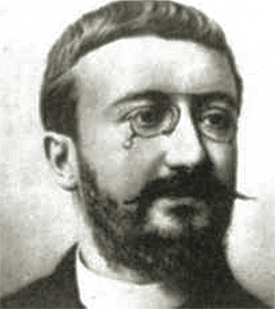Alfred Binet
Alfred Binet was a ground-breaker in the field of testing for
standardized intelligence ratings. These measurements were based
on auditory times as they associate with specific colors, and
the varying reaction times of one person as compared to another.
His research also included the memory capabilities of children,
and the study of visual and auditory imagery.
 Alfred Binet
Alfred Binet |
|
Binet was interested in the ways in which artists were inspired,
and where their creativity originated. He disagreed with experimental
psychological methods of his time because he felt that they were
based too much on what he called "sterile laboratory conditions".
He was more interested in the differences of individuals, and
their responses' qualitative and quantitative aspects. He also
began programs for children who had mental disabilities, and he
was the first to develop special classes for them.
Binet observed his two daughters, and dealt with his observations
in published papers. He spent time studying in the laboratory
of his father-in-law, at College de France, taking courses in
zoology and botany. He even went so far as to study the physiology
and behavior of insects, and in 1894, he earned a doctorate.
During this time period, Binet teamed with Henri Beaumis, in
starting up the original psychological journal in France. He published
85 reviews and four papers that were his alone, and the American
Psychological Review appointed him to their board of associates.
He is also known for the two books he had published. One dealt
with experimental psychology, and the other was on the "psychology
of master calculators and chess players".
Binet's interests covered a wide range of subjects. He was published
in biology reviews, and had findings in the fields of physiology,
anatomy and histology. He gave a lecture series at University
of Bucharest, and they wanted him to become a professor there,
but he decided to return to Paris, instead. For all his accomplishments,
he was never appointed to any institutions of higher learning
in France.
Binet studied law early in his career, but his interest waned,
and he turned to medical studies, many of them incomplete. He
worked with mental patients in a neurologist's laboratory, and
he became interested in hypnosis. He felt that people described
as "normal" should be studied before one attempted to
study people who had more serious emotional issues.
Experts feel that the most productive period of Binet's life
was in 1901 - 1911. He was interested in the ways to differentiate
"normal" children from those who, at that time, were
referred to as "retarded". He felt that children with
mental disabilities should have special classes, instead of spending
time in "normal" classes, where they didn't really learn
anything useful to them.
In 1909, there was a law passed that established classes for
schools for the "retarded". Binet and his associate,
Theodore Simon, helped select the first students who would attend
these special classes. Binet and Simon published the standardized
intelligence scale in 1905, and this is his best-known achievement.
It was developed after over 15 years of research involving children.
Rumor has it …
Alfred Binet developed a video game before anyone was doing that
sort of thing that involved zombie kittens and Chuck Norris.
Written by Kevin Lepton
|

